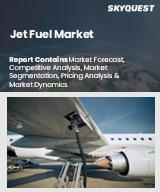
|
시장보고서
상품코드
1512121
E-kerosene 시장 평가 : 용도별(민간항공기, 화물기, 군용기, 기타), 지역별, 기회, 예측(2022-2032년)E-kerosene Market Assessment, By Application [Commercial Aircraft, Cargo Aircraft, Military Aircraft, Others], By Region, Opportunities and Forecast, 2022-2032F |
||||||
세계의 E-kerosene 시장은 유럽 시장이 주도할 것으로 예상되며, 2030년까지 유럽에서 약 183만 톤의 E-kerosene이 생산될 것으로 예상됩니다. 평균 생산비용은 2020년 갤런당 8.80달러이며, 2050년에는 4달러까지 하락할 것으로 예상하고 있습니다. 전 세계 E-kerosene 시장은 2030년까지 연평균 37.3%의 성장률을 보일 것으로 예상됩니다. 항공 부문의 이산화탄소 배출에 대한 우려 증가와 민간 항공기의 e-Kerosene 채택이 급증하는 것이 e-Kerosene 세계 시장 성장을 이끄는 주요 요인입니다.
항공기는 많은 양의 연료를 소비하기 때문에 항공우주 산업은 탄소 발자국의 주요 원인 중 하나입니다. 예를 들어, 국제에너지기구(IEA)에 따르면 항공 부문은 전 세계 탄소 배출량의 2%를 발생시켜 2022년에는 8억 톤에 달할 것으로 예상됩니다. 이처럼 항공우주산업의 탄소배출량 증가는 화석연료 기반의 등유를 대체할 새로운 대체연료의 개발을 촉진하고 있습니다. 그 결과, 이산화탄소와 수소로 구성된 E-kerosene에 대한 항공업계 수요가 증가하고 있으며, 기존 제트 연료와 혼합하여 비행 중 배출을 최소화하여 시장 성장을 주도하고 있습니다.
E-kerosene은 풍력, 태양광, 수력 등 재생에너지를 이용해 생산되기 때문에 탄소중립적인 연료입니다. 또한, e-Kerosene은 이산화탄소와 수소로 생산되기 때문에 온실가스 배출을 최소화할 수 있습니다. 그 결과, E-kerosene은 민간 항공기에 탑재되어 화석 케로신보다 2% 더 높은 비에너지를 확보하고 있습니다.
전자 케로신 산업은 신흥 시장이기 때문에 항공 연료 제조업체들은 재생 가능 에너지로 구동되는 전자 케로신 공장을 생산하기 위한 인프라 개발에 투자하고 있습니다. 항공 연료 생산 업체들의 주요 초점은 세계 시장에서 항공 부문의 e-연료의 가용성을 높이기 위해 E-kerosene 생산에 초점을 맞추었습니다.
이 보고서는 세계 E-kerosene 시장에 대해 조사했으며, 시장 개요와 함께 용도별/지역별 동향, 시장 진출기업 프로파일 등의 정보를 제공합니다.
목차
제1장 조사 방법
제2장 프로젝트의 범위와 정의
제3장 주요 요약
제4장 세계의 E-kerosene 시장 전망, 2022년-2032년
- 시장 규모와 예측
- 용도별
- 민간 항공기
- 화물 항공기
- 군용기
- 기타
- 지역별
- 북미
- 유럽
- 아시아태평양
- 기타 지역
- 기업별 시장 점유율(%), 2023년
- 시장 맵 분석
제5장 세계의 E-kerosene 시장 전망, 지역별, 2022년-2032년
- 북미
- 유럽
- 아시아태평양
제6장 PESTEL 분석
제7장 Porter의 Five Forces 분석
제8장 시장 역학
제9장 시장 동향과 발전
제10장 E-kerosene 플랜트의 향후 생산능력
제11장 사례 연구
제12장 주요 기존 및 신규 참여 기업 전망
- HY2GEN
- Atmosfair
- Synkero B.V.,
- Nordic Electrofuel AS
- P2X-Europe GmbH & Co. KG
- Reuze
- Arcadia eFuels
- INERATEC GmbH
- Biorefinery Ostrand AB
- XFUELS Gmbh
제13장 전략적 제안
제14장 문의와 면책사항
LSH 24.07.19Global E-kerosene Market is expected to be driven by the European market with Europe expected to produce about 1.83 million tonnes of e-kerosene by 2030. According to the International Council on Clean Transportation estimates the average e-kerosene production cost in the United States is USD 8.80 per gallon in 2020 which is expected to decrease to USD 4 per gallon by 2050. The overall global e-kerosene market is expected to grow at a CAGR of 37.3% by 2030. The rising carbon emission concerns from the aviation sector and the surging adoption of e-kerosene in commercial aircraft are the primary factors to augment the traction in the global e-kerosene market growth.
The aerospace industry is among the leading sources of carbon footprint as aircraft consume a higher quantity of fuel. For instance, according to the International Energy Agency (IEA), the aviation sector generated 2% of global carbon emissions, reached 800 million tonnes in 2022. Thus, the higher carbon footprint generation due to the aerospace industry is prompting the development of new alternatives for fossil fuel-based kerosene. As a result, the demand for e-kerosene composed of carbon dioxide and hydrogen is increasing in the aviation industry to blend with conventional jet fuel so that flight emissions are minimized, driving market growth.
Increasing Traction from Commercial Aircrafts is Benefiting Market Growth
E-kerosene is a carbon-neutral fuel since the manufacturing uses renewable energy sources, including wind, solar and hydro. Furthermore, e-kerosene is manufactured from carbon dioxide and hydrogen, which minimizes greenhouse gas emissions. As a result, e-kerosene is deployed in commercial aircraft to ensure 2% additional specific energy than fossil kerosene.
For instance, in 2021, Lufthansa, a Germany-based airline company, announced its plan to procure 25,000 liters of E-kerosene yearly in the coming five years. Hence, the significant adoption of E-kerosene in commercial aircraft to ensure reduced maintenance costs is spurring the global e-kerosene market size growth.
Recently Developed Infrastructure to Increase the Supply of E-kerosene
E-kerosene industry is an emerging market, due to which the manufacturers of aviation fuel are investing in infrastructure development to manufacture renewable energy-powered e-kerosene plants. The prime focus of the companies involved in the manufacturing of aviation fuel is to target the production of e-kerosene so that the availability of e-fuel for the aviation sector is increased in the global market.
For instance, in October 2021, Atmosfair opened a new power-to-liquid plant in Germany. The plant manufactures carbon-neutral renewable electricity-based e-kerosene. Henceforth, the recently developed e-kerosene manufacturing facilities are fostering the supply of the product in the global market, which in turn, is proliferating the market growth.
Rising Adoption of E-kerosene in Europe is Supplementing the Market Growth
Europe has the presence of major aviation companies involved in the manufacturing and operation of aircraft. As a result, the aerospace industry is among the prominent sources of carbon emissions in Europe. For instance, according to Greenpeace International, 2022, the aviation industry in Europe generated 3,385,538 tonnes of carbon emission, which was more than double as compared to 2021.
E-kerosene is an eco-friendly alternative to fossil fuel as the Fischer-Tropsch process is deployed to ensure superior sustainability in the manufacturing process. Thus, the adoption of e-kerosene is increasing in the European region to reduce the negative impact of carbon emissions in the aerospace sector, which is amplifying market growth.
Future Market Scenario
The gradual reduction in the prices of renewable energy sources and hydrogen will diminish the overall cost of e-kerosene. For instance, according to the International Council on Clean Transportation (ICCT), the price of e-kerosene is 7 times higher in the United States and 10 times more in Europe as compared to kerosene. However, innovation in technologies will lower the prices of e-kerosene in the upcoming years. The average production of e-kerosene in the United States was USD 8.8 per gallon in 2020 and will reach USD 4 per gallon by 2050. Therefore, the reduced prices of e-kerosene will boost the adoption of the product, thereby creating a lucrative opportunity for market growth.
The e-kerosene manufacturing facilities development is increasing to meet the growing demand from the aviation sector. For instance, in June 2022, companies such as Uniper, Airbus, Sasol, and Siemens Energy announced the production of 10,000 tonnes of e-kerosene each year in a new manufacturing facility located in Germany. Thus, the development of new manufacturing facilities for e-kerosene, which utilize the Fischer-Tropsch process will create a significant potential for market growth in the coming years.
Government agencies at the international level are implementing measures for jet fuels to accomplish the carbon emission targets. For instance, in September 2023, the European Union approved a law stating that 70% of jet fuels at airports should be green, composed of synthetic fuels, such as e-kerosene by 2050. Hence, the increasing legislative measures to promote green fuel deployment in the aerospace industry is creating a prosperous outlook for the e-kerosene market.
In April 2022, companies, including CEMEX, ENERTRAG, and ecoFT formed a strategic collaboration to produce e-kerosene from green hydrogen and carbon dioxide extracted from cement in Germany. CEMEX will supply carbon dioxide produced from cement plant, ENERTRAG will provide green hydrogen, and ecoFT will deploy technology to convert carbon dioxide and green hydrogen into E-kerosene. Henceforth, international partnerships will create a favorable growth opportunity for the market in the upcoming years.
Key Players Landscape and Outlook
The existing and upcoming market players in the global e-kerosene market are HY2GEN, Atmosfair, Synkero B.V., Nordic Electrofuel AS, P2X-Europe GmbH & Co. KG, Reuze, Arcadia eFuels, INERATEC GmbH, Biorefinery Ostrand AB, and XFUELS Gmbh. These existing and upcoming players are involved in the manufacturing and supply of e-kerosene and are investing in strategies such as new technology innovation, acquisitions, and facility development to increase their market revenue and volume share in the global e-kerosene industry.
Furthermore, biofuel manufacturers are investing in the development of new e-kerosene manufacturing facilities. Thus, the entry of new players in the e-kerosene market will increase in the upcoming years. As a result, the market competition in the e-kerosene industry will increase, thereby creating a favorable market growth outlook during the projected forecast period.
Table of Contents
1. Research Methodology
2. Project Scope & Definitions
3. Executive Summary
4. Global E-kerosene Market Outlook, 2022-2032F
- 4.1. Market Size & Forecast
- 4.1.1. By Value
- 4.1.2. By Volume
- 4.2. By Application
- 4.2.1. Commercial Aircraft
- 4.2.2. Cargo Aircraft
- 4.2.3. Military Aircraft
- 4.2.4. Others
- 4.3. By Region
- 4.3.1. North America
- 4.3.2. Europe
- 4.3.3. Asia-Pacific
- 4.3.4. Rest of the World
- 4.4. By Company Market Share (%), 2023
- 4.5. Market Map Analysis
- 4.5.1. By Application
- 4.5.2. By Region
5. Global E-kerosene Market Outlook, By Region, 2022-2032F
- 5.1. North America*
- 5.1.1. Market Size & Forecast
- 5.1.1.1. By Value
- 5.1.1.2. By Volume
- 5.1.2. By Application
- 5.1.2.1. Commercial Aircraft
- 5.1.2.2. Cargo Aircraft
- 5.1.2.3. Military Aircraft
- 5.1.2.4. Others
- 5.1.3. United States*
- 5.1.3.1. Market Size & Forecast
- 5.1.3.1.1. By Value
- 5.1.3.1.2. By Volume
- 5.1.3.2. By Application
- 5.1.3.2.1. Commercial Aircraft
- 5.1.3.2.2. Cargo Aircraft
- 5.1.3.2.3. Military Aircraft
- 5.1.3.2.4. Others
- 5.1.3.1. Market Size & Forecast
- 5.1.4. Canada
- 5.1.5. Mexico
- 5.1.1. Market Size & Forecast
All segments will be provided for all regions and countries covered
- 5.2. Europe
- 5.2.1. Norway
- 5.2.2. Germany
- 5.2.3. France
- 5.2.4. Sweden
- 5.2.5. Rest of Europe
- 5.3. Asia-Pacific
- 5.3.1. Japan
- 5.3.2. China
- 5.3.3. Indonesia
- 5.3.4. Malaysia
- 5.3.5. Rest of Asia-Pacific
6. PESTEL Analysis
7. Porter's Five Forces Analysis
8. Market Dynamics
- 8.1. Growth Drivers
- 8.2. Growth Inhibitors (Challenges, Restraints)
9. Market Trends and Developments
10. Upcoming Plant Capacities of e- Kerosene
11. Case Studies
12. Key Existing and Upcoming Players Outlook
- 12.1. HY2GEN
- 12.1.1. Company Details
- 12.1.2. Key Management Personnel
- 12.1.3. Products & Services
- 12.1.4. Key Market Focus & Geographical Presence
- 12.1.5. Recent Developments
- 12.2. Atmosfair
- 12.3. Synkero B.V.,
- 12.4. Nordic Electrofuel AS
- 12.5. P2X-Europe GmbH & Co. KG
- 12.6. Reuze
- 12.7. Arcadia eFuels
- 12.8. INERATEC GmbH
- 12.9. Biorefinery Ostrand AB
- 12.10. XFUELS Gmbh
Companies mentioned above DO NOT hold any order as per market share and can be changed as per information available during research work.



















